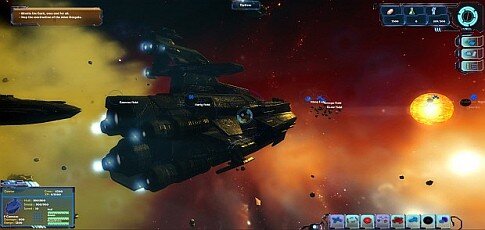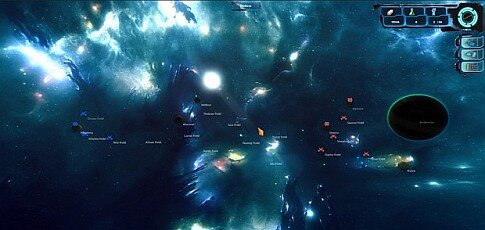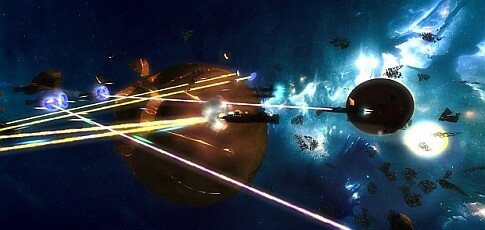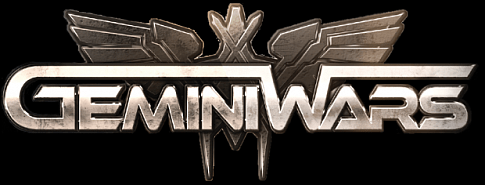Gemini Wars – What We Think:
Gemini Wars is an upcoming RTS developed by Camel 101. It follows in the footsteps of games like Homeworld that saw the “space opera” as a natural setting for the massive meat-grinders that the end-game battles of RTS levels tend to become. While it presses the right RTS buttons, and adds some interesting strategic twists, it tends to capture the feeling of endless travel rather than massive, fast-paced inter-fleet battles. The pacing leans a little too far towards 2001: A Space Odyssey and too far away from, say, Star Wars: A New Hope.

In Gemini Wars, the universe has suffered decades of war. Two rival factions, both human, are confronted by a third, non-human faction who arrives on the scene, and…the rest of the story is told through series of single-player levels in the game’s campaign mode. I found the campaign to be a more than adequate replacement for the tutorial, which, although helpful, was incredibly slow-paced. Lacking the ability to skip past the ploddingly slow diction of your helpful on-board computer made the tutorials lessons in patience.
The general idea behind Gemini Wars is pretty standard to the genre. You can build military vessels of varying qualities based on resources, technology, and population. You can build structures to gather resources and structures to produce units. Ultimately, as is generally the case in these games, a key strategic element is the “guns or butter” dilemma. Given limited resources (such as time, population, and materials), do you build military units and defensive structures, or do you build resource production?
Gemini Wars adds a fairly deep tech tree to the equation, letting you research technology in fields varying from mining technology to individual ship traits. Research stations produce research points that you use to buy technology, so the system is fairly self-contained. Nevertheless, it adds an interesting strategic element and a great deal of depth to what would otherwise be a fairly straightforward game.
On the “guns” side, there’s a little less difficulty in deciding where to invest. The game features (suffers from?) the classic RTS quality whereby building a fleet of long-range attackers and swarming an enemy is as if not more effective than building a smaller but balanced fleet of varied ships. Swarms win, even if they’re not as interesting to use.

However, one very interesting feature of ship combat is the ability to board some of the larger enemy ships. This actually rewards the player who includes ships capable of sending boarding parties. By targeting specific systems of the enemy ship such as weapons, engines, etc., you break down the ships defenses, allowing you to send a party of marines to board. A similar mechanic exists for colonies—essentially jumped-up stations that upgrade themselves and provide marines and civilians.
A word must be said about the speed of the game. It’s a slow, ponderous game. If you were expecting fighters zipping past each other like a dogfight on speed, you’re going to be disappointed. Even the quicker ships move like schoolbuses, and ship combat is a pretty static affair, with ships stopping at range and firing until one or the other is dead. Again, fairly standard for the genre, but a little disappointing for the setting. And although the game is in 3-D, it plays out on a flat plane. It isn’t a deal-breaker, but it’s a missed opportunity for some truly epic battles.

Travel across distances is painfully slow, and is a real detriment to the pace of the game. It does have some strategic impact, though. While in orbit around planets or asteroid fields, ships move at a slow, “impulse” speed. With charged hyperdrives, they can make a quick jump to any neighboring planets or bodies within range, and once the right technology is researched, they can use wormholes to jump to neighboring systems. Because of the limitations on travel range and speed, moving fleets between orbits or systems is a weighty decision. Keeping a fleet within jump distance of an enemy-held planet poses a constant threat, similar to putting a piece in jeopardy in a game of chance.
Consequently, controlling access to neighboring planets and asteroid fields becomes an important defensive objective beyond any benefits from resources in the area. Similarly, sending a fleet of ships on impulse power to a far-removed planet can be an effective way to launch a surprise attack.
On a technical level, the game doesn’t break any new ground. The graphics are decent, but dated. The sound is somewhat lackluster, and the CG cinematics are ten years past their prime. Don’t play this game for the multimedia experience, and don’t worry about upgrading your rig to meet its modest system requirements. Although the version I played was a pre-release copy, I was shocked to find that there wasn’t an option to bind keys, or even a list of commands. Generally, it seems like a game that’s not quite finished, at least for the PC. Hopefully this will change in the days following release.
If you can get past the sluggishness of space travel in the future and the apparent total disregard for tactical maneuvering that the finest military academies of humanity’s worlds will be teaching their students when space flight becomes commonplace, you might like Gemini Wars. There’s a little more strategy than real-time here, and that’s not a bad thing. It’s not for people who memorize build orders for Starcraft. Although it could do with a little polish (and a way to double the game speed), Gemini Wars is worth a look for RTS fans in search of a new fix.
Learn more at Gemini Wars – The Official Site
Get Gemini Wars on Steam
[xrr rating=”3/5″]





